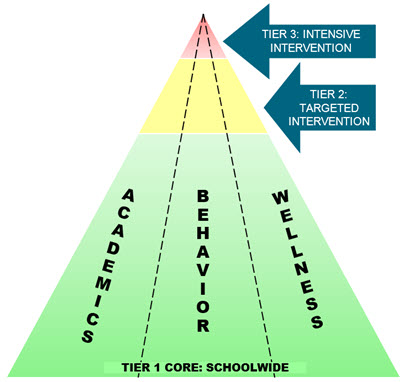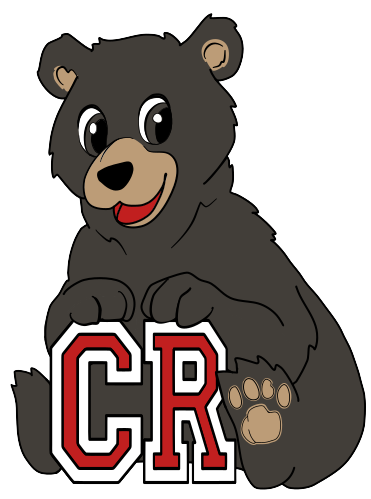Multi-Tiered Systems of Support (MTSS)
A multi-tiered system of support that uses students’ data to make decisions in order to provide high quality instruction and intervention.
In a multi-tiered system of support (MTSS) framework, school teams make data-informed decisions in order to provide high quality instruction. Some students will require additional academic, behavior, and/or social-emotional wellness support. Families are partners in this process, and your child’s school will share information about his or her needs and progress.
Tiers of Support: Academics, Behavior, and Student Wellness

At all tiers, teachers monitor students’ response to core instruction and interventions.
Tier 1 - All students receive:
- Core instruction and reteaching of current grade-level academic, behavior, and wellness standards
- Includes whole group and differentiated small group instruction for current units of study
Tier 2 - Some students receive:
- Re-teaching and extensions of current grade-level essential standards and expectations for academics, behavior, and wellness that continues after a unit of study (in addition to Tier 1 instruction)
- Instruction takes place in small groups of students with similar needs.
Tier 3 - Few students receive:
- Intensive, evidence-based instruction on foundational skills from previous years’ curricula and skills (in addition to Tier 2 and 3 instruction)
- Includes small-group and individualized intensive instruction and support
MTSS at Cub Run: A Team Effort
Educators and families are a team - we all want what is best for all children. In order to guarantee that all students learn at high levels, we use the MTSS instructional framework, outlined below:
The general layers of instruction include:
- Guaranteed Tier 1 (grade-level) curriculum for all.
- If students need reteaching of an essential skill from a previous unit of study (Tier 2), they work with teachers in small groups or individually to master the skill (in addition to Tier 1 instruction).
- If there is a gap in an essential skill from previous years of study, students receive Tier 3 instruction from teachers in small groups or individually to build a foundational skill.
For Tier 2 and Tier 3 instruction:
- Students are typically working on one focused essential skill. A goal is set for the student based on that essential or foundational skill. Tier 1, 2, and 3 instruction can be provided by any teacher who is part of the team - this could include the classroom teacher or a resource teacher. If Tier 2 or Tier 3 instruction is not resulting in adequate progress for the student (data does not meet the goal set by the team), teachers on a grade-level team brainstorm additional strategies. This is in addition to Tier 1 and any Tier 2 instruction.
- If multiple instructional strategies are still not helping the student progress, teachers come together with the school’s MTSS Committee to brainstorm different ways to support.
- This framework ensures collective responsibility for high levels of learning for all our students.
What do these tiers of instruction look like in practice? See a math example and a social-emotional example below:
Cub Run Grade-Level Collaborative Learning Teams
Collaborative Learning Teams are groups of educators that engage in cycles of collective inquiry to learn about and apply best practices together to increase student learning. Each team consists of grade-level teachers, special education teachers, and ESOL teachers. Additional resource teachers, as well as instructional assistants, support teams across all grade levels.
- Kindergarten Collaborative Learning Team:
- Benjamin Bowen, Special Education Teacher
- Dionyah Cottrell, Special Education Teacher
- Brittany Cummings, Kindergarten Teacher
- Sharon Nokovich, Kindergarten Teacher
- Theresia Scoville, Kindergarten Teacher
- Tomi Yost, Enhanced Autism Teacher (Primary)
- 1st Grade Collaborative Learning Team:
- Cindy Bergeron, 1st Grade Teacher
- Dionyah Cottrell, Special Education Teacher
- Tracy Cousino, 1st Grade Teacher
- Danielle Lalande, Special Education Teacher
- Stephanie McWhirt, 1st Grade Teacher
- 2nd Grade Collaborative Learning Team:
- Kristen Coch, 2nd Grade Teacher
- Jenna Jensen, 2nd Grade Teacher
- Soo lee, 2nd Grade Teacher
- Tamara Nagle, Special Education Teacher
- Tomi Yost, Enhanced Autism Teacher (Primary)
- 3rd Grade Collaborative Learning Team:
- Danielle Brown, 3rd Grade Teacher
- Rachel Claessen, 3rd Grade Teacher
- Melissa Huband, Enhanced Autism Teacher (Upper)
- Tamara Nagle, Special Education Teacher
- Jenny Sisk, 3rd Grade Teacher
- 4th Grade Collaborative Learning Team:
- Brandy Hagen, 4th Grade Teacher
- Melissa Huband, Enhanced Autism Teacher (Upper)
- Danielle Lalande, Special Education Teacher
- Eunice Lee, 4th Grade Teacher
- Meghan Mason, 4th Grade Teacher
- Soraya Rahnama, Special Education Teacher
- 5th Grade Collaborative Learning Team:
- Kelly Dent, 5th Grade Teacher
- Melissa Huband, Enhanced Autism Teacher (Upper)
- Sarah McDonald, Special Education Teacher
- Sandra Norton, 5th Grade Teacher
- Soraya Rahnama, Special Education Teacher
- Patricia Smithwick, 5th Grade Teacher
- Sevval Yeter, 5th Grade Teacher
- 6th Grade Collaborative Learning Team:
- Gregg Buddenhagen, Special Education Teacher
- Bruce Koblinski, 6th Grade Teacher
- Sarah McDonald, Special Education Teacher
- Samia Martinez, 6th GradeTeacher
- Raphael Olivos, 6th GradeTeacher
- Support All Collaborative Learning Teams:
- Teresa Fennessy, Interim Principal
- Nausheen Haider, Assistant Principal
- Becky Allison, Reading Teacher
- Naomi Egerton Baker, Advanced Academics Resource Teacher
- Shannon Barry, School Counselor
- Kristein Buesing, School Counselor
- Sarah Phillips, Instructional Coach
- Patti Rodriguez, English for Speakers of Other Languages (ESOL) Teacher
- Allison Willis, English for Speakers of Other Languages (ESOL) Teacher
Family Support
Family involvement has a positive impact on student achievement.
- Talk with your child’s teacher.
- Encourage your child’s participation in class.
- Review and talk about schoolwork and what your child is learning and doing.
- Celebrate successes.
- Be knowledgeable about your child’s progress.
- Be aware of school-wide communications.
Key Components of MTSS
- Collective Responsibility:
- belief that all students will achieve high levels of learning
- staff taking on the collective responsibility to ensure that students succeed
- High Quality Core Instruction: instruction in academics, behavior, and wellness.
- Monitoring Student Progress: practice of reviewing students’ data over time to evaluate progress
- Data Informed Decision-Making Across the Tiers: decisions driven by data to inform instruction
- Early Implementation of Evidence-Based Interventions: provision of timely support to include materials and methods that have been researched, tested, and found to be effective for large groups of diverse students
- Family, School, and Community Partnership: active partnerships to ensure student success
Cub Run MTSS Committee Members
The MTSS Committee members meet at least weekly. They partner with teachers across the building to brainstorm solutions to improve academic, behavior, and wellness across Tier 1, 2, and 3 instruction.
- Nausheen Haider, Assistant Principal
- Becky Allison, Reading Teacher
- Kristen Buesing, School Counselor
- Kristen Coch, 2nd Grade Teacher
- Courtney Marques, Social Worker
- Meghan Mason, 4th Grade Teacher
- Stephanie McWhirt, 1st Grade Teacher
- Sandra Norton, 1st Grade Teacher
- Sarah Phillips, Instructional Coach
- Carol Ann Timpson, Special Education Department Chair
- Allison Willis, English for Speakers of Other Languages (ESOL) Teacher
- Denise Wilson, School Psychologist
If you have any questions or would like more information about the MTSS process at Cub Run, please feel free to reach out to an MTSS committee member or your child’s teacher.
